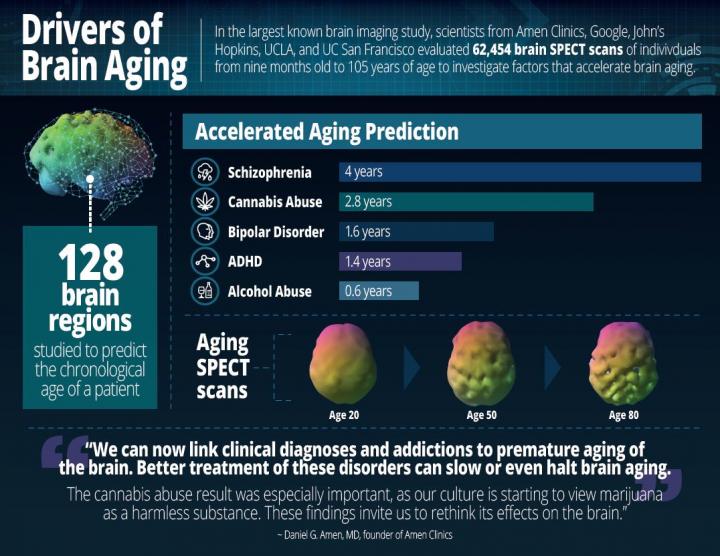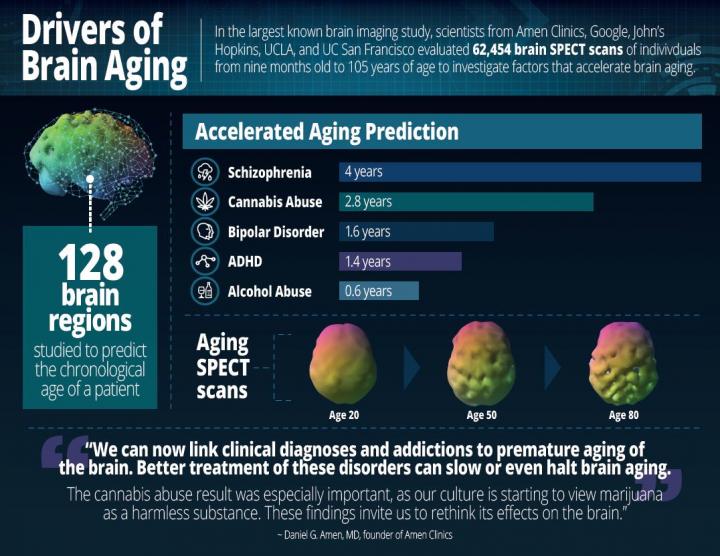
Credit: Credit: Daniel G. Amen
COSTA MESA, CA, August 21, 2018 – In the largest known brain imaging study, scientists from Amen Clinics (Costa Mesa, CA), Google, John's Hopkins University, University of California, Los Angeles and the University of California, San Francisco evaluated 62,454 brain SPECT (single photon emission computed tomography) scans of more than 30,000 individuals from 9 months old to 105 years of age to investigate factors that accelerate brain aging. SPECT tomography) evaluates regional cerebral blood flow in the brain that is reduced in various disorders.
Lead author, psychiatrist Daniel G. Amen, MD, founder of Amen Clinics, commented, "Based on one of the largest brain imaging studies ever done, we can now track common disorders and behaviors that prematurely age the brain. Better treatment of these disorders can slow or even halt the process of brain aging. The cannabis abuse finding was especially important, as our culture is starting to see marijuana as an innocuous substance. This study should give us pause about it."
The current study used brain SPECT imaging to determine aging trajectories in the brain and which common brain disorders predict abnormally accelerated aging. It examined these functional neuroimaging scans from a large multi-site psychiatric clinic from patients who had many different psychiatric disorders, including bipolar disorder, schizophrenia and attention deficit hyperactivity disorder (ADHD).
Researchers studied 128 brain regions to predict the chronological age of the patient. Older age predicted from the scan compared to the actual chronological age was interpreted as accelerated aging. The study found that a number of brain disorders and behaviors predicted accelerated aging, especially schizophrenia, which showed an average of 4 years of premature aging, cannabis abuse (2.8 years of accelerated aging), bipolar disorder (1.6 years accelerated aging), ADHD (1.4 years accelerated aging) and alcohol abuse (0.6 years accelerated aging). Interestingly, the researchers did not observe accelerated aging in depression and aging, which they hypothesize may be due to different types of brain patterns for these disorders.
Commenting on the study, George Perry, PhD, Chief Scientist at the Brain Health Consortium from the University of Texas at San Antonio, said, "This is one of the first population-based imaging studies, and these large studies are essential to answer how to maintain brain structure and function during aging. The effect of modifiable and non-modifiable factors of brain aging will further guide advice to maintain cognitive function."
Co-investigator Sachit Egan, Google Inc. (Mountain View, CA), said, "This paper represents an important step forward in our understanding of how the brain operates throughout the lifespan. The results indicate that we can predict an individual's age based on patterns of cerebral blood flow. Additionally, groundwork has been laid to further explore how common psychiatric disorders can influence healthy patterns of cerebral blood flow."
###
Media Contact
Diana Murray
[email protected]
718-640-5678
@IOSPress_STM
http://www.iospress.com
Related Journal Article
http://dx.doi.org/10.3233/JAD-180598





